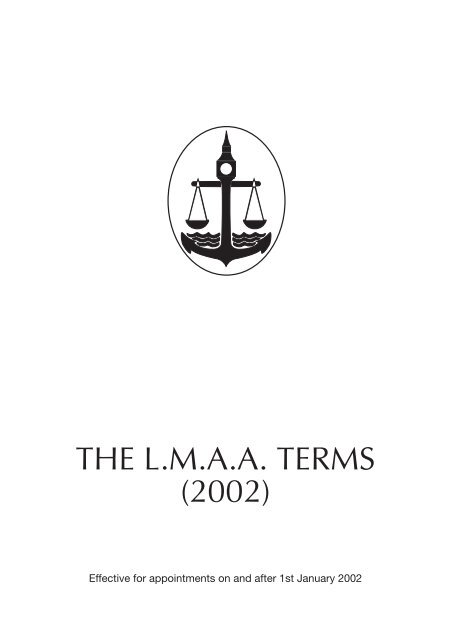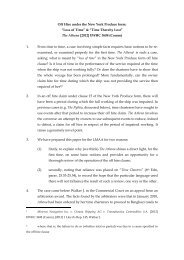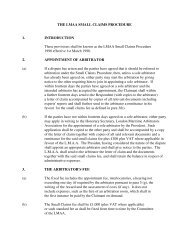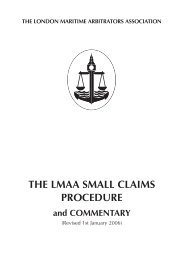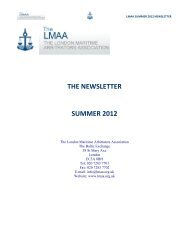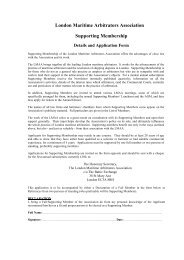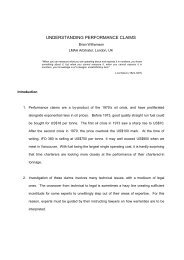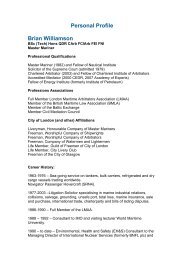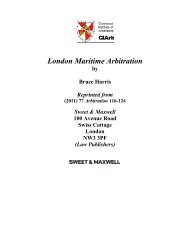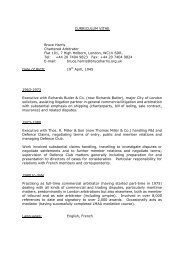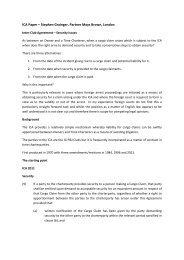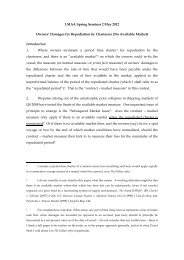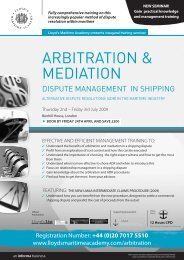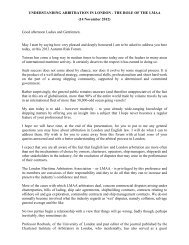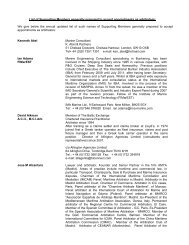THE L.M.A.A. TERMS (2002) - LMAA | London Maritime Arbitrators ...
THE L.M.A.A. TERMS (2002) - LMAA | London Maritime Arbitrators ...
THE L.M.A.A. TERMS (2002) - LMAA | London Maritime Arbitrators ...
You also want an ePaper? Increase the reach of your titles
YUMPU automatically turns print PDFs into web optimized ePapers that Google loves.
<strong>THE</strong> L.M.A.A. <strong>TERMS</strong>(<strong>2002</strong>)Effective for appointments on and after 1st January <strong>2002</strong>
<strong>THE</strong> L.M.A.A. <strong>TERMS</strong> (<strong>2002</strong>)PRELIMINARY1. These Terms may be referred to as “the L.M.A.A Terms (<strong>2002</strong>)”.2. In these Terms, unless the context otherwise requires,(i) “the Association” means the <strong>London</strong> <strong>Maritime</strong> <strong>Arbitrators</strong> Association;“Member of the Association” includes full, retired and supporting members;“President” means the President for the time being of the Association(ii) “tribunal” includes a sole arbitrator, a tribunal of two or more arbitrators, and anumpire(iii) “original arbitrator” means an arbitrator appointed (whether initially or bysubstitution) by or at the request of a party as its nominee and any arbitrator dulyappointed so to act following failure of a party to make its own nomination.3. The purpose of arbitration according to these Terms is to obtain the fair resolutionof maritime and other disputes by an impartial tribunal without unnecessary delayor expense. The arbitrators at all times are under a duty to act fairly and impartiallybetween the parties and an original arbitrator is in no sense to be considered as therepresentative of his appointor.APPLICATION4. These Terms apply to arbitral proceedings commenced on or after 1st January<strong>2002</strong>. Section 14 of the Arbitration Act 1996 (“the Act”) shall apply for the purposeof determining on what date arbitral proceedings are to be regarded as havingcommenced.5. These Terms shall apply to an arbitration agreement whenever the parties haveagreed that they shall apply and the parties shall in particular be taken to have soagreed:(a) whenever the dispute is referred to a sole arbitrator who is a full Member of theAssociation and whenever both the original arbitrators appointed by the partiesare full Members of the Association, unless both parties have agreed or shallagree otherwise;(b) whenever a sole arbitrator or both the original arbitrators have been appointedon the basis that these Terms apply to their appointment.Whenever a sole arbitrator or both the original arbitrators have been appointed onthe basis referred to at (b), such appointments or the conduct of the parties intaking part in the arbitration thereafter shall constitute an agreement between theparties that the arbitration agreement governing their dispute has been made orvaried so as to incorporate these Terms and shall further constitute authority totheir respective arbitrators so to confirm in writing on their behalf.6. In the absence of any agreement to the contrary the parties to all arbitralproceedings to which these Terms apply agree:(a) that the law applicable to their arbitration agreement is English law; and(b) that the seat of the arbitration is in England.7. (a) Subject to paragraph (b), the arbitral proceedings and the rights andobligations of the parties in connection therewith shall be in all respectsgoverned by the Act save to the extent that the provisions of the Act are varied,modified or supplemented by these Terms.1
(b) Where the seat of the arbitration is outside England and Wales the provisionsof these Terms shall nevertheless apply to the arbitral proceedings, save to theextent that any mandatory provisions of the law applicable to the arbitrationagreement otherwise provide.<strong>THE</strong> ARBITRAL TRIBUNAL8. If the tribunal is to consist of three arbitrators:(a) each party shall appoint one arbitrator not later than 14 days after service of arequest in writing by either party to do so;(b) the two so appointed may at any time thereafter appoint a third arbitrator solong as they do so before any substantive hearing or forthwith if they cannotagree on any matter relating to the arbitration;(c) the third arbitrator shall be the chairman unless the parties shall agreeotherwise;(d) before the third arbitrator has been appointed or if the position has becomevacant, the two original arbitrators, if agreed on any matter, shall have thepower to make decisions, orders and awards in relation thereto;(e) after the appointment of the third arbitrator decisions, orders or awards shallbe made by all or a majority of the arbitrators;(f) the view of the chairman shall prevail in relation to a decision, order or award inrespect of which there is neither unanimity nor a majority under paragraph (e).9. If the tribunal is to consist of two arbitrators and an umpire:(a) each party shall appoint one arbitrator not later than 14 days after service of arequest in writing by either party to do so;(b) the two so appointed may appoint an umpire at any time after they themselvesare appointed and shall do so before any substantive hearing or forthwith ifthey cannot agree on any matter relating to the arbitration;(c) the umpire shall attend any substantive hearing and shall following hisappointment be supplied with the same documents and other materials as aresupplied to the other arbitrators;(d) the umpire may take part in the hearing and deliberate with the originalarbitrators;(e) decisions, orders and awards shall be made by the original arbitrators unlessand until they cannot agree on a matter relating to the arbitration. In that eventthey shall forthwith give notice in writing to the parties and the umpire,whereupon the umpire shall replace them as the tribunal with power to makedecisions, orders and awards as if he were the sole arbitrator.JURISDICTION10. The jurisdiction of the tribunal shall extend to determining all disputes arising underor in connection with the transaction the subject of the reference, and each partyshall have the right before the tribunal has given notice of its intention to proceed toits award to refer to the tribunal for determination any further dispute(s) arisingsubsequent to the commencement of the arbitral proceedings.TRIBUNAL’S FEES11. Provisions regulating fees payable to the tribunal and other related matters are setout in the First Schedule. Save as therein or herein otherwise provided, payment of2
the tribunal’s fees and expenses is the joint and several responsibility of the parties.An arbitrator or umpire shall be entitled to resign from a reference in thecircumstances set out in paragraph (C) of the First Schedule.ARBITRATION PROCEDURE12. (a) It shall be for the tribunal to decide all procedural and evidential matterssubject to the right of the parties to agree any matter. However, the normalprocedure to be adopted is as set out in the Second Schedule.(b) In the absence of agreement it shall be for the tribunal to decide whether andto what extent there should be oral or written evidence or submissions in thearbitration. The parties should however attempt to agree at an early stagewhether the arbitration is to be on documents alone (i.e. without a hearing) orwhether there is to be an oral hearing.INTERLOCUTORY PROCEEDINGS13. (a) In all cases the procedure set out in paragraphs 1 to 4 of the Second Scheduleshould be adopted.(b) Applications for directions should not be necessary but, if required, they shouldbe made in accordance with the Second Schedule.(c) Arbitrations on documents aloneFollowing completion of the steps covered by paragraphs 1 to 4 of the SecondSchedule, if it has been or is then determined by the tribunal or agreed by theparties that the case is to be dealt with on documents alone, the tribunal willthen give notice to the parties of its intention to proceed to its award and will soproceed unless either party within seven days requests, and is thereaftergranted, leave to serve further submissions and/or documents.(d) Oral hearingsIf it is determined or agreed that there shall be an oral hearing, then followingthe fixing of the hearing date a booking fee will be payable in accordance withthe provisions of the First Schedule.POWERS OF <strong>THE</strong> TRIBUNAL14. In addition to the powers set out in the Act, the tribunal shall have the followingspecific powers to be exercised in a suitable case so as to avoid unnecessarydelay or expense, and so as to provide a fair means for the resolution of thematters falling to be determined:(a) The tribunal may limit the number of expert witnesses to be called by any partyor may direct either that no expert be called on any issue(s) or that no expertevidence shall be called save with the leave of the tribunal.(b) Where two or more arbitrations appear to raise common issues of fact or law, thetribunals may direct that the two or more arbitrations shall be heard concurrently.Where such an order is made, the tribunals may give such directions as theinterests of fairness, economy and expedition require including:(i) that the documents disclosed by the parties in one arbitration shall bemade available to the parties to the other arbitration upon such conditionsas the tribunals may determine;(ii) that the evidence given in one arbitration shall be received and admitted inthe other arbitration, subject to all parties being given a reasonableopportunity to comment upon it and subject to such other conditions asthe tribunals may determine.3
(c) If a party fails to comply with a peremptory order of the tribunal to providesecurity for costs, then without prejudice to the power granted by section 41(6)of the Act, the tribunal shall have power to stay that party’s claim or such partof it as the tribunal thinks fit in its sole discretion.PRELIMINARY MEETINGS15. (a) The tribunal may decide at any stage that the circumstances of the arbitrationrequire that there should be a preliminary meeting to enable the parties and thetribunal to review the progress of the case; to reach agreement so far aspossible upon further preparation for, and the conduct of the hearing; and,where agreement is not reached, to enable the tribunal to give such directionsas it thinks fit.(b) A preliminary meeting should be held in complex cases including most casesinvolving a hearing of more than five days’ duration. Exceptionally more thanone preliminary meeting may be required.(c) All preliminary meetings (whether required by the tribunal or held on theapplication of the parties) should be preceded by a discussion between theparties’ representatives who should attempt to identify matters for discussionwith the tribunal, attempt to reach agreement so far as possible on thedirections to be given, and prepare for submission to the tribunal an agenda ofmatters for approval or determination by it.(d) Before the preliminary meeting takes place the parties should provide thetribunal with a bundle of appropriate documents, together with informationsheets setting out the steps taken and to be taken in the arbitration, a list ofany proposed directions whether agreed or not and an agenda of matters fordiscussion at the hearing. The information sheets should include estimates ofreadiness for the hearing and the likely duration of the hearing.(e) There is set out in the Third Schedule a guidance document indicating topicswhich may be appropriate for consideration before and at the preliminaryhearing.SETTLEMENT16. It is the duty of the parties (a) to notify the tribunal immediately if the arbitration issettled or otherwise terminated (b) to make provision in any settlement for paymentof the fees and expenses of the tribunal and (c) to inform the tribunal of the parties’agreement as to the manner in which payment will be made of any outstandingfees and expenses of the tribunal, e.g. for interlocutory work not covered by anybooking fee paid. The same duty arises if the settlement takes place after aninterim award has been made. Upon being notified of the settlement or terminationof any matter the tribunal may dispose of the documents relating to it.17. Any booking fee paid will be dealt with in accordance with the provisions ofparagraph (D)(1)(d) of the First Schedule. Any other fees and expenses of thetribunal shall be settled promptly and at latest within 28 days of presentation of therelevant account(s). Notwithstanding the terms of any settlement between themthe parties shall remain jointly and severally responsible for all such fees andexpenses of the tribunal until they have been paid in full.ADJOURNMENT18. If a case is for any reason adjourned part-heard, the tribunal will be entitled to aninterim payment, payable in equal shares or otherwise as the tribunal may direct, inrespect of fees and expenses already incurred, appropriate credit being given forthe booking fee.4
AVAILABILITY OF ARBITRATORS19. (a) In cases where it is known at the outset that an early hearing is essential, theparties should consult and ensure the availability of the arbitrator(s) to beappointed by them.(b) If, in cases when the tribunal has already been constituted, the fixture of anacceptable hearing date is precluded by the commitments of the originalappointee(s), the provisions of the Fourth Schedule shall apply.<strong>THE</strong> AWARD20. The time required for preparation of an award must vary with the circumstances ofthe case. The award should normally be available within not more than six weeksfrom the close of the proceedings. In many cases, and in particular where thematter is one of urgency, the interval should be substantially shorter.21. The members of a tribunal need not meet together for the purpose of signing theiraward or of effecting any corrections thereto.22. (a) If before the award is made one or more parties to the reference shall givenotice to the tribunal that a reasoned award is required, the award shall containthe reasons for the award.(b) The parties agree to dispense with reasons in all cases where no notice shallhave been given to the tribunal under paragraph (a) before the award is made.[Note: the effect of such agreement is to exclude the court’s jurisdiction underSection 69 of the Act to determine an appeal on a question of law arising out ofthe award; see Section 69(1)](c) Where in accordance with paragraph (b) the parties have agreed to dispensewith reasons the tribunal will issue an award without reasons together with adocument which does not form part of the award but which gives, on aconfidential basis, an outline of the reasons for the tribunal’s decision (hereaftercalled “privileged reasons”).(d) Unless the court shall otherwise determine, the document containingprivileged reasons (referred to in paragraph (c)) may not be relied upon orreferred to by either party in any proceedings relating to the award.23. As soon as possible after an award has been made it shall be notified to the partiesby the tribunal serving on them a notice in writing which shall inform the parties ofthe amount of the fees and expenses of the tribunal and which shall indicate thatthe award is available for sending to or collection by the parties upon full paymentof such amount. At the stage of notification neither the award nor any copy thereofneed be served on the parties and the tribunal shall be entitled thereafter to refuseto deliver the award or any copy thereof to the parties except upon full payment ofits fees and expenses.24. If any award has not been paid for and collected within one month of the date ofpublication, the tribunal may give written notice to either party requiring payment ofthe costs of the award, whereupon such party shall be obliged to pay for andcollect the award within fourteen days.25. (a) In addition to the powers set out in Section 57 of the Act, the tribunal shallhave the following powers to correct an award or to make an additional award:(i) The tribunal may on its own initiative or on the application of a party correctany accidental mistake, omission or error of calculation in its award.(ii) The tribunal may on the application of a party give an interpretation of aspecific point or part of the award.5
<strong>THE</strong> FIRST SCHEDULETRIBUNAL’S FEES(A) Appointment feeAn appointment fee is payable on appointment by the appointing party or by theparty at whose request the appointment is made. The appointment fee shall be astandard fee fixed by the Committee of the Association from time to time. Unlessotherwise agreed, the appointment fee of an umpire or third arbitrator shall in thefirst instance be paid by the claimant, and the appointment fee of an agreed solearbitrator shall be paid by each party in equal shares.(B) Interim feesAn arbitrator may in his discretion require payment of his fees to date (whichexpression shall for these purposes include any expenses) at appropriate intervals(which shall be not less than three months). Any such demand for payment shallbe addressed to the arbitrator’s appointing party and shall be copied to any othermember of the tribunal and other parties. A third arbitrator or umpire shall requirepayment from the parties in equal shares. Any such demand for payment iswithout prejudice (a) to ultimate liability for the fees in question and (b) to theparties’ joint and several liability therefor.(C) Right to resign for non-paymentIf any amount due under (A) or (B) above remains unpaid for more than 28 daysafter payment has been demanded, the arbitrator in his sole discretion may givewritten notice to his appointor and to the other parties and arbitrators that he willresign his appointment if such amount still remains unpaid 14 days after suchnotification. Without prejudice to ultimate liability for the fees in question, any otherparty may prevent such resignation by paying the amount demanded within thesaid 14 days. Upon any resignation under this paragraph the arbitrator will beentitled to immediate payment of his fees to date, and shall be under no liability toany party for any consequences of his resignation.(D) Booking fees(1) (a) For a hearing of up to ten days’ duration there shall be payable to the tribunal abooking fee of £350 per person or such other sum as the Committee of theAssociation may from time to time decide, for each day reserved. The bookingfee will be invoiced to the party asking for the hearing date to be fixed or to theparties in equal shares if both parties ask for the hearing date to be fixed as thecase may be and shall become due and shall be paid within 14 days ofconfirmation of the reservation or six months in advance of the first dayreserved (“the start date”), whichever date be the later. If the fee is not paid infull by the due date the tribunal will be entitled to cancel the reservationforthwith without prejudice to its entitlement to be paid the fee in question orthe appropriate proportion thereof in accordance with sub-paragraph (d)below. In the event of a cancellation under this provision either party maysecure reinstatement of the reservation by payment within seven days of anybalance outstanding.(b) For hearings over ten days’ duration the booking fee in sub-paragraph (1)(a)above shall for each day reserved be increased by 30% in the case of a hearingof up to 15 days and 60% in the case of a hearing of up to 20 days and may, atthe discretion of the tribunal, be subscribed in non-returnable instalmentpayments. For hearings in excess of 20 days the booking fee shall be at the7
ate for a hearing of 20 days plus such additional sum as may be agreed withthe parties in the light of the length of the proposed hearing.(c) The booking fee for any third arbitrator or umpire shall be due and payable asabove, save that the booking fee due to any third arbitrator or umpireappointed less than six months before the start date shall be due forthwithupon his appointment and payable within 14 days thereof.(d) Where, (i) at the request of one or both of the parties, or (ii) by reason ofsettlement of any dispute, or (iii) by reason of cancellation pursuant to subparagraph(a) above or (iv) by reason of the indisposition or death of anyarbitrator or umpire a hearing is adjourned or a hearing date vacated prior to oron or after the start date, then, unless non-returnable instalment or otherpayments have been agreed, the booking fee will be retained by (or, if unpaid,shall be payable to) the tribunal (i) in full if the date is adjourned or vacated lessthan three months before the start date or on or after that date, (ii) as to 50 percent if the date is adjourned or vacated three months or more before the startdate. Any interlocutory fees and expenses incurred will also be payable or, asthe case may be, deductible from any refund under (ii).(e) Where, at the request of one or both of the parties, or by reason of theindisposition or death of any arbitrator or umpire a hearing is adjourned or ahearing date is vacated and a new hearing date is fixed, a further booking feewill be payable in accordance with sub-paragraphs (a) and (b) above.(2) An arbitrator or umpire who, following receipt of his booking fee or any part thereof,is for any reason replaced is, upon settlement of his fees for any interlocutory work,responsible for the transfer of his booking fee to the person appointed to act in hisplace. In the event of death the personal representative shall have correspondingresponsibility.(E) Security for costs of awards(1) Without prejudice to the rights provided for in paragraphs (A), (B) and (D) above, atribunal is entitled to reasonable security for its estimated costs (including its feesand expenses) up to the making of an award. In calculating such amount credit willbe given for any booking fees paid. Such security is to be provided no later than 21days before the start of any oral hearing intended to lead to an award or, in the caseof a documents-only arbitration, no later than immediately before the tribunal startsreading and drafting with a view to producing an award.(2) If a tribunal exercises the right to request security under sub-paragraph (1) above,it shall advise the parties of its total estimated costs (a) in the case of an oralhearing, usually when such hearing is fixed and in any event no later than 28 daysbefore the security must be in place, and (b) in the case of a documents-onlyarbitration 28 days before the tribunal intends to start reading and/or drafting witha view to producing an award.(3) Requests for security hereunder shall be addressed to the party requesting anyoral hearing, and to the claimant in the case of a documents-only arbitration. Ifsuch party fails to provide such security within the time set any other party will begiven 7 days’ notice in which to provide it, failing which the tribunal may vacate anyhearing dates or, in the case of a documents-only arbitration, refrain from readingand/or drafting.(4) In any case where time does not allow for the periods in sub-paragraphs (1)-(3)above, the tribunal shall be entitled at its discretion to set such shorter periods asare reasonable in the circumstances.(5) The form of such security shall be in the tribunal’s discretion. Normally an8
undertaking from an appropriate firm of lawyers or a P&I or Defence Associationwill be acceptable. However, a tribunal may require a cash deposit or bankguarantee. Any undertaking or guarantee must undertake to pay the sum coveredno later than 5 weeks after publication of the relevant award and shall not beconditional upon the award being released unless the costs thereof are whollycovered by the relevant security.(6) No estimate given hereunder shall prejudice the tribunal’s entitlement to itsreasonable fees and expenses.(7) Any security provided or payment made in accordance with these provisions shallbe without prejudice to ultimate liability as between the parties for the fees andexpenses in question, and to the parties’ joint and several liability to the tribunaluntil all outstanding fees and expenses have been paid in full.(F) Accounting for payments made on accountWhere the case proceeds to an award, or is settled subsequent to the start of thehearing, appropriate credit will be given for any amounts paid under paragraphs(B), (D) or (E) above in calculating the amount to be paid in order to collect theaward, or as the case may be, the amount payable to the tribunal upon settlementof the case.ACCOMMODATION(1) If accommodation and/or catering is arranged by the tribunal, the cost will normallybe recovered as part of the cost of the award, but where a case is adjourned partheardor in other special circumstances, the tribunal reserves the right to direct thatthe cost shall be provisionally paid by the parties in equal shares (or as the tribunalmay direct) promptly upon issue of the relevant account. Prior to bookingaccommodation and/or catering the tribunal may, if it thinks fit, request that it beprovided with security sufficient to cover its prospective liabilities in respectthereof.(2) If accommodation is reserved and paid for by the parties and it is desired that thecost incurred be the subject of directions in the award, the information necessaryfor that purpose must be furnished promptly to the tribunal.9
<strong>THE</strong> SECOND SCHEDULEARBITRATION PROCEDURE1. The normal procedure (which shall apply unless the parties agree otherwise)requires service of claim submissions. If, exceptionally, formal pleadings arethought appropriate (e.g. in more complicated references) special permission mustbe obtained from the tribunal. Whether claim submissions or points of claim areserved, they must set out the position of the claimants in respect of the issues thathave arisen between the parties as clearly, concisely and comprehensively aspossible, and must always be accompanied by all supporting documentationrelevant to the issues between the parties.2. Except in unusual cases (e.g. applications for interim final awards for sums whichare said to be indisputably due and owing) defence submissions or, if the tribunalhas permitted formal pleadings, points of defence (and counterclaim, if any) with alldocumentation relevant to the issues between the parties (other than thatdisclosed by the claimants) are to be served 28 days after receipt of the claimsubmissions or points of claim. An allegation that all relevant documentation hasnot been disclosed with the claim submissions or points of claim will not normallybe a reason for allowing additional time for service of defence submissions orpoints of defence. However a failure to disclose all relevant documentation at anappropriate stage may be penalised in costs.3. Submissions in reply or, if the tribunal has permitted formal pleadings, points ofreply are to be served 14 days after service of submissions or points of defenceunless there is also a defence to a counterclaim, in which case the submissions orpleadings are to be served within 28 days from receipt of the submissions or pointsof defence and counterclaim. Any reply to the defence to counterclaim must beserved within 14 days thereafter.4. A party serving supporting documentation must check with the tribunal whether itwishes to receive copies of all or some of the documentation at that stage. Theaim should be for a tribunal to see enough documentation to be able to identify theissues in the case but not to be burdened with, for instance, copy invoices at thecommencement of a reference.5. All submissions and pleadings must be set out in numbered paragraphs.6. Bare denials in response to an allegation will not be acceptable. If an allegation isdenied, reasons must be given and if appropriate a positive contrary case put forward.7. Applications for security for costs will not be considered until after service ofdefence submissions (or points of defence, if formal pleadings have beenpermitted). Any application must be accompanied by a justification for it and abreakdown of the costs which it is reasonably anticipated will be incurred up to thestage of the reference for which security is sought. In the light of paragraph (E) ofthe First Schedule it will not be appropriate for security for costs to include anyprovision for the fees of a tribunal.8. Unless the parties agree that the reference is ready to proceed to an award on theexclusive basis of the written submissions that have already been served, bothparties must complete the Questionnaire set out at the end of this Schedule within 14days of the service of the final submissions or pleadings as set out in paragraph 4above. Unless the parties agree, the tribunal will then establish the future proceduralcourse of the reference, either on the basis of the Questionnaires and any otherapplications made to it in writing or, if appropriate, after a preliminary meeting.9. Subject to any specific agreement between the parties or ruling from the tribunal,both parties are entitled at any stage to ask each other for any documentation that10
they consider to be relevant which has not previously been disclosed. Parties willnot generally be required to provide broader disclosure than is required by thecourts. Generally a party will only be required to disclose the documents on whichit relies or which adversely affect its own case, as well as documents which eithersupport or affect the other party’s case.10. If a party wishes to obtain disclosure of certain documents prior to service ofsubmissions or a pleading, it must seek the agreement of the other party, failingwhich it should make an appropriate written application to the tribunal, explainingthe rival positions of the parties in question.11. In appropriate cases the tribunal may order the service of a statement of truthsigned by an officer or by the legal representative of a party confirming theaccuracy of any submissions or of any declarations that a reasonable search forrelevant documentation has been carried out.12. Subject to contrary agreement of the parties or an appropriate ruling by the tribunal,the parties will be required to exchange statements of evidence of fact (whether tobe adduced in evidence under the Civil Evidence Acts or to stand as evidence inchief) as well as expert evidence covering areas agreed by the parties or ordered bythe tribunal within a time scale agreed by the parties or ordered by the tribunal.Statements of evidence of fact or expert evidence that have not been exchanged inaccordance with these provisions will not be admissible at a hearing without leaveof the tribunal which will only be granted in exceptional circumstances.13. Any application to a tribunal for directions as to procedural or evidential mattersshould, save in exceptional circumstances, be made only after the other party hasbeen afforded an opportunity to agree, within three working days, the terms of thedirections proposed. Any application that has not previously been discussed withthe representatives of such other party and that does not fully record the rivalpositions of the parties will normally simply be rejected by a tribunal. If a party hasbeen requested by another party to discuss and agree any application, but hasfailed to respond within three working days (or such other time as may be allowedby the tribunal), the tribunal will not elicit the comments of that party or makeorders conditional on objections not being received.14. Communications regarding procedural matters should be made expeditiously.15. Tribunals will not acknowledge receipt of correspondence despite any request tothat effect unless there is particular reason to do so.16. Only in the most exceptional circumstances can it be appropriate for a party toquestion the terms of any procedural order made or seek a review of it by thetribunal.17. If a tribunal considers that unnecessary costs have been incurred at any stage of areference, it may of its own volition or on the application of a party make rulings asto the liability for the relevant discrete costs. Unnecessary costs may be incurredby, e.g., inappropriate applications having been made or not agreed, excessivephotocopying or unnecessary communications being generated by the samemessage being sent by fax and/or e-mail, and mail and/or courier. Tribunals mayorder such costs to be assessed and paid immediately.QUESTIONNAIRE(Information to be provided as required in paragraph 8 of the Second Schedule to the<strong>LMAA</strong> Terms)As many as possible of the procedural issues should be agreed by the parties. Ifagreement has been possible, then please make that clear in the answers to theQuestionnaire.11
1. A brief note of the nature of the claim (e.g. “unsafe port”or “balance of accountsdispute”).2. Approximate quantum of the claim.3. Approximate quantum of any counterclaim.4. The principal outstanding issues requiring determination raised by the claim andany counterclaim.5. Are any amendments to the claim, defence or counterclaim required?6. Are any of the issues in the reference suitable for determination as a preliminaryissue?7. Are there any areas of disclosure that remain to be dealt with?8. Would a preliminary meeting be useful, and if so at what stage?9. What statement evidence is it intended to adduce and by when; and (if there is tobe a hearing) what oral evidence will be adduced?10. What expert evidence is it intended to adduce by way of reports and/or oraltestimony and by when will experts reports be exchanged? Generally a meeting ofexperts will be useful. Unless the parties agree or the tribunal rules that such ameeting would not be appropriate, when should the meeting take place?11. Suggested timetable for preparation for the close of submissions if the case is togo ahead on documents alone or for a hearing if that is appropriate.12. Estimated length of the hearing, if any.13. Which witnesses of fact and experts is it anticipated will be called at the hearing, ifthere is to be one?14. Is it appropriate for a hearing date to be fixed now? (Save in exceptionalcircumstances, a hearing date will not be fixed until the preparation of the case issufficiently advanced to enable the duration of the hearing to be properlyestimated; this will normally be after disclosure of documents has beensubstantially completed.)15. Estimated costs of each party(i) up to completion of this Questionnaire; and(ii) through to the end of the reference.16. Does either party consider that it is entitled to security for costs and, if so, in whatamount?17. Have the parties considered whether mediation might be worthwhile?12
<strong>THE</strong> THIRD SCHEDULEPRELIMINARY MEETINGSThis Schedule sets out, in check-list form, the topics which may be appropriate forconsideration when a preliminary meeting is to be held in accordance with paragraph15 of the Terms.The circumstances in which a preliminary meeting may be held vary very considerably.In some cases (including the more complex arbitrations and most cases involving ahearing of more than five days) a preliminary meeting is necessary and will be held onthe initiative of the tribunal or at the request of the parties, after much of thepreparatory work has been done, to review the progress of the case and to enabledirections to be made or agreed for further preparation for, and the conduct of, thehearing. In other cases a dispute may have arisen as to some procedural matter (e.g. afailure to serve submissions or a pleading or to give adequate disclosure of documents)and a party may seek to persuade the tribunal to give appropriate directions (including,in a proper case, a peremptory order under Section 41(5) of the Act) so as to resolvethe matter.Whatever the occasion for a preliminary meeting with the arbitrators, two generalprinciples apply; first, that an application to the arbitrators for a particular order shouldnormally be made only after the other party has been afforded a reasonableopportunity to agree the terms of the directions proposed (see paragraph 13 of theSecond Schedule); second, that, wherever possible, a preliminary meeting should bepreceded by a discussion between the parties’ representatives as to the future conductof the case along the lines indicated in paragraph 15 of the Terms.The check-list sets out some of the most important matters for consideration.However, many of the points mentioned will not arise unless the parties have agreed orthe tribunal has ordered some procedure other than that contemplated by the SecondSchedule. Such points, which are marked *, are included to cover cases of this kind.The check-list cannot attempt to be comprehensive. Inevitably, certain matters mustbe left to the discretion of the tribunal and the parties’ advisers. The opportunity istaken to list the procedural matters which may need to be considered in a logical orderfrom the commencement of the arbitration. It should however be possible in caseswhere, for whatever reason, the Second Schedule is not followed, for the directionsrelating to at least the earlier stages of the arbitration to be agreed with the other party,or failing agreement to be dealt with on a written application to the arbitrators andwithout the need for a preliminary meeting (see paragraph 8 of the Second Schedule).1. Can the arbitration be decided on documents only?The parties and their advisers should consider at the outset whether the case issuitable to be decided without an oral hearing (see paragraph 12(c) of the Terms).2. Submissions and pleadings *(i) A time-table should be ordered or agreed for the service of submissions orpleadings.(ii) Once an initial exchange has taken place, it should be considered whether areply is necessary and whether requests for further details (includingparticulars) of the other party’s case are necessary and if made whether allsuch requests have been properly dealt with.(iii) As the case proceeds and further documents become available, thesubmissions or pleadings should be reviewed to see:(a) whether amendments are required;13
(b) whether all issues are still alive.3. Disclosure of documents *(i) A time-table should be ordered or agreed either for the disclosure of all relevantdocuments or for the initial disclosure of such specified categories ofdocuments as may be ordered or agreed.(ii) Applications for further disclosure should initially be made to the opposingparty, and if not complied with, by application to the tribunal.(iii) Disputes as to outstanding disclosure should not normally require a specificmeeting with the arbitrators and applications can often best be reserved until apreliminary meeting is to take place in any event.(iv) Consideration should always be given to whether it can be ordered or agreedthat the ambit of disclosure be limited so as to avoid unnecessary delay andexpense.4. Factual evidence(i) Can some facts/figures be agreed or admitted?(ii) A time-table should be ordered or agreed for the exchange of statements (oraffidavits) of witnesses of fact.(iii) It should be ordered or agreed:(a) whether the statements or affidavits are to be admitted without calling themaker to give oral evidence at the hearing or(b) whether the statements are to stand as the evidence in chief of thewitnesses subject to their attending to give oral evidence; and(c) whether the evidence of any witness is to be taken in advance or by meansof a live telephone or video link or by use of a video recording.(iv) In any case where it may be desired to seek the assistance of a Court (whetherwithin or outside the United Kingdom) to secure the attendance of witnesses atthe hearing, to obtain documentary or other evidence, to record oral testimonyfor presentation to the tribunal or to exercise other powers in support of thearbitral proceedings, the party intending to invoke the assistance of the Courtshould first where practicable seek the agreement of the other parties to themaking of the application to the Court or, if agreement cannot be reached,should apply to the tribunal for permission to make the application (seeSections 43 and 44 of the Act) and for directions as to when and how it is to bemade.5. Expert evidence(i) It should be ordered or agreed whether or not the case requires expertevidence to be adduced and, if so, the subjects on which expert evidence isnecessary and the number and disciplines of the experts.(ii) If it is ordered or agreed that the case is one requiring expert evidence theorder or agreement should provide(a) whether each party is to adduce expert evidence; and/or(b) whether the tribunal should appoint experts or assessors to assist it ontechnical matters (see Section 37 of the Act);(iii) Where expert evidence is to be adduced by the parties a time-table should beordered or agreed for the following:14
(a) the exchange of experts’ reports;(b) any “without prejudice” meeting of experts held to agree or narrow theissues;(c) the drawing up of a memorandum by the experts setting out what has beenagreed and what remains in issue;(d) the service of supplementary experts’ reports;(iv) It should be ordered or agreed whether the tribunal will deal with the technicalissues on the basis of the experts’ reports, without the need for the authors togive oral evidence.6. Preliminary Issues/Interim AwardsBoth the tribunal and the parties should consider at any preliminary meeting:(i) what are the important matters in issue between the parties;(ii) how are those issues best decided;(iii) whether time and expense will be saved if one or more issues (e.g.interpretation of contract) are decided as preliminary issues;(iv) whether liability and damages should be decided at one hearing or separately.7. Questions to the partiesIt may be considered whether one of the parties (or the tribunal) should putquestions to a party and in what form this should be done.8. Procedure at the hearingDirections may be given as to:(i) what if any rules of evidence will apply and generally as to the manner and formin which the evidence is to be presented at the hearing;(ii) the length of time available for witnesses to give their evidence or for parties ortheir representatives to present their arguments;(iii) whether arguments are to be in written or oral form or a combination of the two.9. Investigations by the TribunalWould any investigations by the tribunal assist in ascertaining the facts?10. InspectionWould the tribunal be assisted by attending trials or experiments, or inspecting anyobject featuring in the dispute?11. Documents(i) If possible provide agreed chronology and dramatis personae;(ii) arrangements of documents (e.g. different bundles for different topics, or asappropriate) and dates by which bundles to be produced;(iii) unnecessary inclusion of documents to be avoided;(iv) when documents are voluminous, consider copying only key bundles andproviding a core bundle.15
12. Advance reading(i) Provision of pleadings and other suitable material (e.g. experts’ reports) to thetribunal as far in advance of the hearing as possible.(ii) Should time be set aside during the hearing, after appropriate opening, forprivate reading of any documents by tribunal (to reduce time otherwiseinvolved in reading documents out)?13. Multi-party disputes(i) Concurrent or consecutive hearings (see paragraph 14 (b) of the Terms);(ii) procedure generally.14. RepresentationLevel of representation at the hearing to be appropriate to the case.15. Hearing dates(The fixing of dates will, in the majority of cases, be most usefully considered afterdiscovery has been substantially completed. An application for a date to be fixedshould not, however, be made until the parties are able to make a realistic estimateof how long the hearing is likely to last, and when the parties will be ready.)(i) Estimated duration of hearing.(ii) When can parties realistically be expected to be ready?(iii) Any problems re availability of witnesses? (If so, can these be mitigated bytaking evidence in advance, using proofs/affidavits at the hearing, by means ofa live telephone or video link, or by use of a video recording?)(iv) Availability of tribunal (see paragraph 19 of the Terms and the FourthSchedule).(v) Accommodation required and numbers attending.(vi) Any special facilities (e.g. transcripts, interpreters, etc.).(vii) Arrangements for accommodation, etc.: who to book/pay for?16. CostsEstimates should be given of the parties’ respective costs up to the date of themeeting, and through to the end of the hearing.16
<strong>THE</strong> FOURTH SCHEDULERECONSTITUTION OF <strong>THE</strong> TRIBUNALThe following provisions are directed to avoiding delay which the parties or either ofthem consider unacceptable, but if both parties prefer to retain a tribunal as alreadyconstituted they remain free so to agree.1. The governing factor will be the ability of the tribunal to fix a hearing date within areasonable time of the expected readiness date as notified by the parties onapplication for a date or, if they are not agreed as to the expected readiness date,within a reasonable time of whichever forecast date the tribunal considers morerealistic.2. For hearings of up to 10 days’ estimated duration, what constitutes a reasonabletime will (unless the parties apply for a date further ahead) be determined byreference to the estimated length of hearing as follows:ESTIMATED DURATION REASONABLE TIME(i) Up to 2 days 3 months(ii) 3-5 days 6 months(iii) 6-10 days 10 months“Relevant time-scale” is used below to mean whichever of the foregoing periods isapplicable and, in cases of more than 10 days’ duration, such corresponding timescaleas the tribunal may consider appropriate.3. A sole arbitrator who is unable to offer a date within the relevant time-scale willoffer to retire and, if so requested by the parties or either of them, will retire uponbeing satisfied that an appropriate substitute appointment has been effected bythe parties; in event of their disagreement, either party may request the Presidentto make the necessary substitute appointment.4. In all other cases, unless all members of the tribunal are able to offer a matchingdate within the relevant time-scale:(A) the tribunal will have regard to any agreed preference of the parties, but if thereis no agreed preference the tribunal will fix:(i) the earliest hearing date that can be given by any member(s) able to offer aguaranteed date within the relevant time-scale;(ii) if a guaranteed date within the relevant time-scale cannot be offered byany member of the tribunal, the earliest date thereafter which can beguaranteed by any member(s) of the tribunal; on the basis, in either case,that any member then unable (by reason of a prior commitment) toguarantee the date so fixed will (unless that prior commitment hasmeanwhile cleared) retire by notice given six clear weeks prior to the startdate.(B) Upon notification of any such retirement an appropriate substitution will beeffected as follows:(i) If an original arbitrator retires the substitute shall be promptly appointed byhis appointer; or failing such appointment at least 21 days prior to the startdate the substitute will then be appointed by the umpire or third arbitratoror, if an umpire or third arbitrator has not yet been appointed, the substitutewill be appointed by the President;(ii) If an umpire or third arbitrator retires the substitute will be appointed by theoriginal arbitrators.17
5. For the purpose of Paragraph (4):(A) “appropriate substitution” means appointment of a substitute able to matchthe hearing date established in accordance with sub-paragraph (A);(B) “start date” means the first date reserved for the hearing;(C) An umpire or third arbitrator will retain power to make any necessarysubstitution under sub-paragraph (B)(i) notwithstanding that he may himselfhave given notice of retirement under sub-paragraph (A) and an originalarbitrator will retain the like power under sub-paragraph (B)(ii).6. An arbitrator or umpire who retires as mentioned above shall:(i) be entitled to immediate payment of his fees and expenses incurred up to thedate of his retirement; and(ii) incur no liability to any party by reason thereof.18
<strong>THE</strong> L.M.A.A. <strong>TERMS</strong> (<strong>2002</strong>)COMMENTARYThe <strong>LMAA</strong> Terms were last amended in parallel with, and came into effect at the sametime as, the 1996 Act. The new revision (the <strong>LMAA</strong> Terms (<strong>2002</strong>)), which applies to allreferences commenced on or after 1st January, <strong>2002</strong>, is designed to meet needs whichhave become apparent since 1997.* * *The most important changes are to be found in the Second Schedule. That reflects,with a number of alterations, what were previously the Procedural Guidelines. However,it is important to note that the provisions of this Schedule are not merely indicative. Asparagraph 12(c) of the Terms says: “ ... the normal procedure to be adopted is as set outin the Second Schedule.” Henceforth, therefore, in the absence of some agreement ofthe parties or particular direction by the tribunal to the contrary, the Second Scheduleprocedure is to apply to all <strong>LMAA</strong> arbitrations under the <strong>2002</strong> Terms.It provides, in the usual case, for submissions (not formal pleadings) accompanied bydocuments, and it contains a timetable for the exchange of such submissions.Provision is also made for other interlocutory matters. A detailed survey is notappropriate here: the Schedule will repay a careful study by arbitrators andpractitioners alike. However, it may be appropriate to highlight just a few matters.Paragraph 7 deals with security for costs (not normally to be ordered until after serviceof defence submissions) and paragraph 8 requires the parties to complete aquestionnaire in all cases to enable proper procedure to be laid down or agreed, unlessthe case is ready for an award on the exclusive basis of the written submissions thathave already been served. Of frequent practical importance will be paragraph 13,which requires a party making an application to seek the other party’s agreement, andwhich should reduce the amount of interlocutory correspondence by making itunnecessary in most cases for tribunals to seek comments on such applications.Paragraph 17 makes it clear that special orders may be made when costs are wasted.The new Second Schedule has meant that substantial passages from paragraphs 12,13 and 14 of the 1997 Terms have been omitted.* * *Where once <strong>London</strong> arbitrators generally experienced only insignificant problems inrecovering fees and expenses, the situation has changed considerably in recent years.Accordingly it has been felt necessary to alter the First Schedule substantially so as (a)to give arbitrators the right to seek interim payments of their fees and expenses (notmore often than once every three months), (b) to give them the right (though not theobligation) to resign if such payments are not made and (c) to give tribunals the right torequire security for their costs before embarking on a hearing or on the work requiredto prepare an award in a documents-only case.Apart from offering necessary protection to arbitrators, these provisions are thoughtlikely to be welcomed by users who will be kept better informed about the actual andlikely future costs of their cases.The opportunity has also been taken to clarify matters such as the right to booking feesand the right to cancel a hearing where they are not paid (paragraph (D)(1)(a); theentitlement of third arbitrators and umpires to booking fees ((D)(1)(c)), and the positionconcerning booking fees in the event of various matters leading to an adjournment orvacation of dates ((D)(1)(d) and (e)).* * *19
Other changes to the Terms are largely consequential, or of a tidying-up nature, or tomodernise the language, but two particular points may usefully be mentioned.Paragraph 14(c) of the Terms reinstates the power to stay a claim for want of provisionof security for costs, rather than simply to dismiss it; and paragraph 17 makes it clearthat parties remain jointly and severally responsible for arbitrators’ costsnotwithstanding the terms of any settlement they may reach between themselves.20
Printed by Signal Press Limited, Beckenham BR3 1QZ


